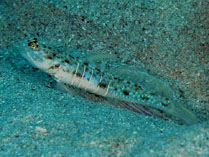| Family: |
Gobiidae (Gobies), subfamily: Gobiinae |
| Max. size: |
5.5 cm SL (male/unsexed) |
| Environment: |
reef-associated; marine; depth range 1 - 20 m |
| Distribution: |
Indo-Pacific. |
| Diagnosis: |
Dorsal spines (total): 6-7; Dorsal soft rays (total): 10-10; Anal spines: 1-1; Anal soft rays: 9-10. Characterized by pale grey to brownish body color with five large, ovate dark brown blotches on side of body; anterior part of body with narrow white bars; upper half of head and body with brown mottling and small blue spots; blue streaks aligned with fin rays on median fins; prolonged and filamentous third dorsal spine; united pelvic fins, well developed frenum present; small ctenoid scales covering body; head without scales except small patch of ctenoid scales above operculum; greatest depth of body 5.4-5.6 in SL; oblong caudal fin, equal or longer than head length (Ref. 90102). |
| Biology: |
Found in sheltered coastal bays, lagoons and estuaries (Ref. 48637). Also found in sand-rubble bottoms in 1-20 m (Ref 90102). |
| IUCN Red List Status: |
Not Evaluated (N.E.) Ref. (130435)
|
| Threat to humans: |
harmless |
Source and more info: www.fishbase.org. For personal, classroom, and other internal use only. Not for publication.

